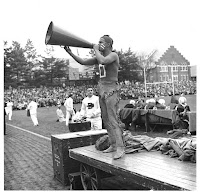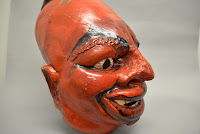 "At football games, some Dartmouth students have been known to go barefoot and wear nothing but red war paint on their upper torsos, whooping it up on the sidelines with a jug marked XXX as a joke" – John McCallum, Ivy League Football Since 1872.
"At football games, some Dartmouth students have been known to go barefoot and wear nothing but red war paint on their upper torsos, whooping it up on the sidelines with a jug marked XXX as a joke" – John McCallum, Ivy League Football Since 1872.For much of the college's history, Dartmouth held a connection with Native Americans based more in fascination than in fact. Inspired by real historical students enrolled in Eleazar Wheelock's short-lived Indian Charity School but with very few contemporary Native American classmates, Dartmouth students began creating "Indian" traditions and symbols around the turn of the 20th century. The rise in popularity of college sports became a particular catalyst for this type of branding, as newspapers in Boston started calling Dartmouth teams "Indians" in the 1920s. From gracing official college letterheads to serving as the inspiration for the popular "Wah Hoo Wah" call, the symbol pervaded every facet of college life. Nowhere was the "Indian" more visible than when used as a costume during sporting events.
 Two of these wearable "Indian" symbols are housed in Rauner Special Collections. The first is a set of costumes worn by Dartmouth cheerleaders from the 1950s to the early 1970s. Meant to represent the popular image of an Indian, the costumes are made from deerskin leather and include leggings, loincloths, and raccoon-fur hair pieces. Cheerleaders (all male at the time) would have worn these costumes during sporting events at the college, performing halftime imitation "war dances" for the crowd.
Two of these wearable "Indian" symbols are housed in Rauner Special Collections. The first is a set of costumes worn by Dartmouth cheerleaders from the 1950s to the early 1970s. Meant to represent the popular image of an Indian, the costumes are made from deerskin leather and include leggings, loincloths, and raccoon-fur hair pieces. Cheerleaders (all male at the time) would have worn these costumes during sporting events at the college, performing halftime imitation "war dances" for the crowd. Fans followed the example of these official cheerleaders, often creating their own costumes for the game and reenacting a popular college song about Eleazar Wheelock bringing education – and alcohol – to the local Native Americans.
The blatancy of costume caricatures was undoubtedly part of the catalyst for Native American Dartmouth students to publish a petition in 1968 calling for the removal of the Indian symbol from college life. The petition specifically mentions halftime war dance imitations as a point of grievance.
Bill Yellowtail, a Native American Dartmouth student in 1971, sums up the position of the petition, which successfully convinced the college to abolish use of the symbol: "We feel we did our part in eliminating another false illusion. Too many people in this country still think of Indians as savages doing war dances and wearing feathered headdresses and having two-word vocabularies: 'how and ugh'."
 |
| Hover to view image. |
Proponents of the "Dartmouth Indian" argued for decades that the mascot was, among other things, a respectful representation of Native Americans – a symbol that reflected Dartmouth's origin as a charity school for native students in the 1750s. One cannot help but be skeptical of this claim when considering these two costumes and their uses.
To see the cheerleading costumes, come to Rauner and ask for Realia 82. The Indian head is in our Realia 545 collection, and the cheerleading photographs are in the Cheerleaders II Photo File.
Posted for Savannah Eller '22, recipient of a Historical Accountability Student Research Internship for the 2019-2020 academic year. The Historical Accountability Student Research Program provides funding for Dartmouth students to conduct research with primary sources on a topic related to issues of inclusivity and diversity in the college's past. For more information, visit the program's website.
No comments :
Post a Comment